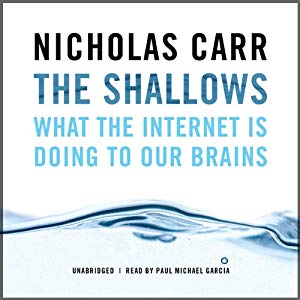You are here
The Shallows: What the Internet is Doing to Our Brains (2010) [audiobook+ebooks]
Primary tabs
| Size | Seeds | Peers | Completed |
|---|---|---|---|
| 141.21 MiB | 1 | 0 | 325 |

.
Finalist for the 2011 Pulitzer Prize in General Nonfiction
Nicholas Carr has written a Silent Spring for the literary mind.
—Michael Agger, Slate
“Is Google making us stupid?” When Nicholas Carr posed that question, in a celebrated Atlantic Monthly cover story, he tapped into a well of anxiety about how the Internet is changing us. He also crystallized one of the most important debates of our time: As we enjoy the Net’s bounties, are we sacrificing our ability to read and think deeply?
Now, Carr expands his argument into the most compelling exploration of the Internet’s intellectual and cultural consequences yet published. As he describes how human thought has been shaped through the centuries by “tools of the mind”―from the alphabet to maps, to the printing press, the clock, and the computer―Carr interweaves a fascinating account of recent discoveries in neuroscience by such pioneers as Michael Merzenich and Eric Kandel. Our brains, the historical and scientific evidence reveals, change in response to our experiences. The technologies we use to find, store, and share information can literally reroute our neural pathways.
Building on the insights of thinkers from Plato to McLuhan, Carr makes a convincing case that every information technology carries an intellectual ethic―a set of assumptions about the nature of knowledge and intelligence. He explains how the printed book served to focus our attention, promoting deep and creative thought. In stark contrast, the Internet encourages the rapid, distracted sampling of small bits of information from many sources. Its ethic is that of the industrialist, an ethic of speed and efficiency, of optimized production and consumption―and now the Net is remaking us in its own image. We are becoming ever more adept at scanning and skimming, but what we are losing is our capacity for concentration, contemplation, and reflection.
Part intellectual history, part popular science, and part cultural criticism, The Shallows sparkles with memorable vignettes―Friedrich Nietzsche wrestling with a typewriter, Sigmund Freud dissecting the brains of sea creatures, Nathaniel Hawthorne contemplating the thunderous approach of a steam locomotive―even as it plumbs profound questions about the state of our modern psyche. This is a book that will forever alter the way we think about media and our minds.
Listening Length: 10h6m
____________________________________________
Another ConCen Exclusive® chapterized and size reduced for optimum efficiency just for you, because we care, shmoopy!
- Log in to post comments

Comments
Just re-reading Douglas
Just re-reading Douglas Rushkoff (Program or Be Programmed) and thought I would add his passing note here:
"The outsourcing of our memory to machines expands the amount of data to which we have access, but degrades our brain’s own ability to remember things. Yet this process of offloading our remembered information began with the invention of text, and met with similar critique even back then. We have been consistently using our brains less as hard drives and more as processors— putting our mental resources into active RAM. What’s different now, however, is that it’s not just lists, dates, and recipes that are being stored for us, but entire processes. The processes we used to use for finding a doctor or a friend, mapping a route, or choosing a restaurant are being replaced by machines that may, in fact, do it better. What we lose in the bargain, however, is not just the ability to remember certain facts, but to call upon certain skills. What we lose in the bargain, however, is not just the ability to remember certain facts, but to call upon certain skills.
We encode a way of doing something and if the computer is capable of accomplishing that task, we never need to know how it happens again. It’s a bit like doing arithmetic by algorithm, which most of us learned for calculating square roots and long division. We learn how to push the numbers through a series of rote steps to get our answer, but forget how or why it really works. Now we’re having our computers remember those processes, which removes us one step further from whatever is going on. So instead of simply offloading our memory to external hard drives, we’re beginning to offload our thinking as well. And thinking is not like a book you can pick up when you want to, in your own time. It is something that’s always on. Are we choosing to surrender the ability to do it without digital assistance? If so, are we prepared to remain connected to our networks all the time? What new ability, if any, are we making room for in the process?"